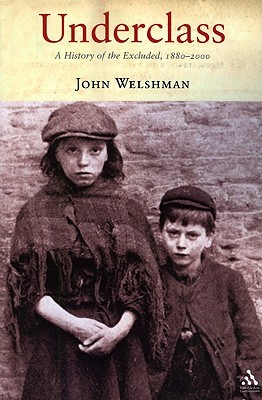
- We will send in 10–14 business days.
- Author: John Welshman
- Publisher: CONTINNUUM 3PL
- Year: 2007
- Pages: 320
- ISBN-10: 1852855541
- ISBN-13: 9781852855543
- Format: 16.1 x 22.8 x 2.3 cm, minkšti viršeliai
- Language: English
- SAVE -10% with code: EXTRA
Reviews
Description
Who are those at the bottom of society? There has been much discussion in recent years, on both Left and Right, about the existence of an alleged 'underclass' in both Britain and the USA. It has been claimed this group lives outside the mainstream of society, is characterised by crime, suffers from long-term unemployment and single parenthood, and is alienated from its core values. In Underclass: A History of the Excluded, 1880-2000 John Welshman shows that there have always been concerns about an 'underclass', whether constructed as the 'social residuum' of the 1880s, the 'problem family' of the 1950s or the 'cycle of deprivation' of the 1970s. There are marked differences between these concepts, but also striking continuities. Indeed a concern with an 'underclass' has is many ways been as long as an interest in poverty itself. This book is the first to look systematically at the question, providing new insights on contemporary debates about behaviour, poverty and welfare reform.
In a speech in 2006, Tony Blair signalled a major push on social exclusion. He aimed to show the Government's determination to tackle 'a hard core underclass' estimated at 1 m people. The focus in Whitehall had moved to what were termed 'high-risk, high-harm and high-cost families', and to children in care, teenage mothers, and people with mental health problems on benefit.
In all of this, the rhetoric of a 'cycle of deprivation', and of inter-generational continuities, was ever-present, and it is those continuities that this book seeks to explore.
EXTRA 10 % discount with code: EXTRA
The promotion ends in 23d.17:37:02
The discount code is valid when purchasing from 10 €. Discounts do not stack.
- Author: John Welshman
- Publisher: CONTINNUUM 3PL
- Year: 2007
- Pages: 320
- ISBN-10: 1852855541
- ISBN-13: 9781852855543
- Format: 16.1 x 22.8 x 2.3 cm, minkšti viršeliai
- Language: English English
Who are those at the bottom of society? There has been much discussion in recent years, on both Left and Right, about the existence of an alleged 'underclass' in both Britain and the USA. It has been claimed this group lives outside the mainstream of society, is characterised by crime, suffers from long-term unemployment and single parenthood, and is alienated from its core values. In Underclass: A History of the Excluded, 1880-2000 John Welshman shows that there have always been concerns about an 'underclass', whether constructed as the 'social residuum' of the 1880s, the 'problem family' of the 1950s or the 'cycle of deprivation' of the 1970s. There are marked differences between these concepts, but also striking continuities. Indeed a concern with an 'underclass' has is many ways been as long as an interest in poverty itself. This book is the first to look systematically at the question, providing new insights on contemporary debates about behaviour, poverty and welfare reform.
In a speech in 2006, Tony Blair signalled a major push on social exclusion. He aimed to show the Government's determination to tackle 'a hard core underclass' estimated at 1 m people. The focus in Whitehall had moved to what were termed 'high-risk, high-harm and high-cost families', and to children in care, teenage mothers, and people with mental health problems on benefit.
In all of this, the rhetoric of a 'cycle of deprivation', and of inter-generational continuities, was ever-present, and it is those continuities that this book seeks to explore.


Reviews